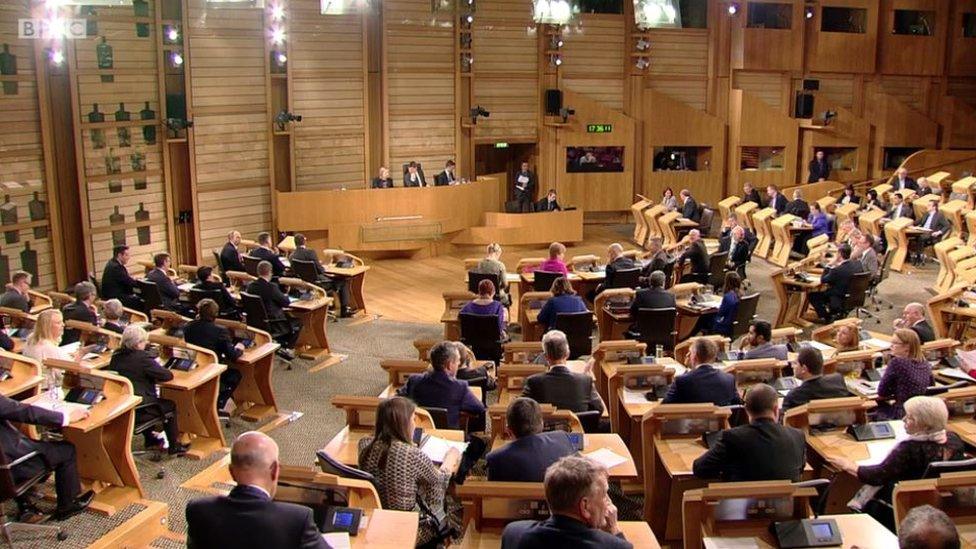Scottish budget passes first vote after SNP-Green deal
- Published
- comments
Nicola Sturgeon says her priority is not to cut taxation for Scotland's top 10% income earners
The Scottish budget has been voted through the first stage of the legislative process after a deal between the SNP and Greens.
MSPs backed Finance Secretary Derek Mackay's tax and spending plans by a margin of 67 to 59.
A deal was struck with the Greens totalling £220m of extra spending, including £160m for local authorities.
The deal will also see the threshold for the 40p rate of income tax frozen at £43,000.
The same threshold is being raised to £45,000 in the rest of the UK, so the move means higher-rate tax payers elsewhere will pay up to £400 less tax every year than people earning the same wage in Scotland. The Scottish government had originally planned to raise the threshold only by the rate of inflation.
Green co-convener Patrick Harvie told MSPs that his party had secured "the biggest budget compromise in the history of devolution in Scotland".
Speaking at First Minister's Questions, Nicola Sturgeon said her priority was not to cut taxes for the top 10% earning Scottish taxpayers.
But Scottish Conservative leader Ruth Davidson accused Ms Sturgeon of setting out to make Scotland the highest taxed part of the UK.
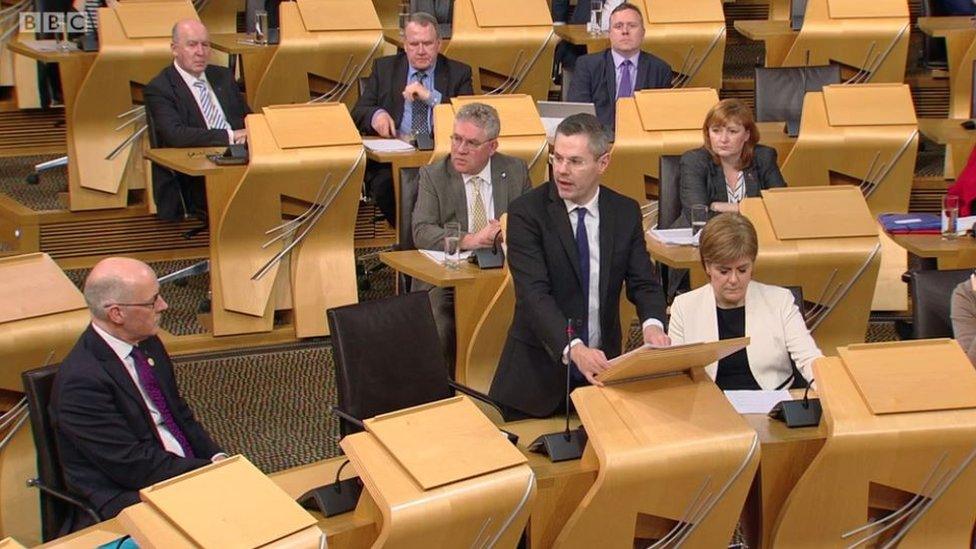
Derek Mackay said he had negotiated with other parties "in good faith"
Previous votes on the budget proposals and on taxation had failed to find any consensus between the parties.
However Mr Mackay confirmed on Thursday morning that a deal had been struck with the Greens, centred around £160m of extra funding for the core council grant.
It will also see £25m extra for the police reform budget and £35m for Scottish Enterprise, and a freezing of the higher 40p rate of tax at £43,000. The threshold for this rate in the rest of the UK is to rise to £45,000.
Mr Mackay said this would only affect 10% of the population, who would end up paying more tax than people earning the same amount in the rest of the UK.
He said the "income forgone amounts to £7.70 a week - less than the cost of a prescription in England".
Mr Mackay said: "I entered into discussions with all parties in good faith in order to build the consensus we need to deliver a budget for Scotland. I particularly welcome the constructive approach taken by the Scottish Greens.
"My latest assessment of the financial position this year and our projections for 2017/18 has enabled me to identify available resources to support additional spending.
"I therefore propose, with the support of the Scottish Green party for all stages of this budget to allocate additional resources, of £160m, to local government to be spent at the discretion of individual authorities.
"Once again this government has listened and acted."
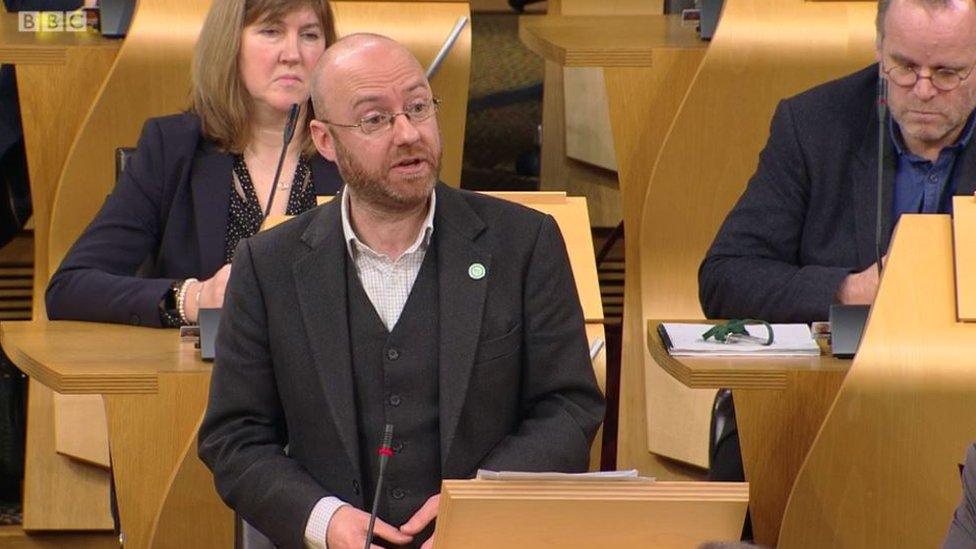
Patrick Harvie said he had secured the biggest budget concessions in the history of devolution
Challenged about the deal by Labour's Kezia Dugdale, Mr Harvie said he believed the Scottish government had "given far less ground than I think they could on taxation".
But he added: "The reality though is £160m additional [funding] going into the un-ringfenced local government allocation.
"The fact that the Scottish government found this money in other ways [than taxation] is not what I would have wished.
"This is not a budget I would have written, but nobody who cares about protecting public services in Scotland can look at that extra £160m investment and say, no thanks, I'd rather just keep ranting and make no difference in people's lives."
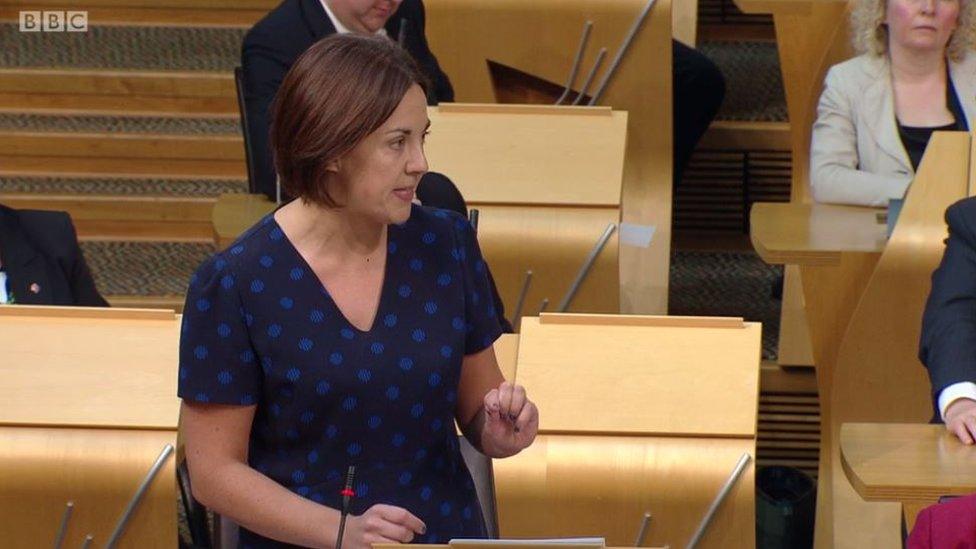
Kezia Dugdale said the Greens had abandoned any claims to be a party of the progressive left
Mr Harvie was attacked by other opposition leaders from across the chamber.
Ms Dugdale said: "To accept anything less than bold use of this parliament's tax powers is an astonishing and deeply disappointing revelation from the Greens.
"And let's not kid ourselves. This isn't the Greens' responsibility to parliament shining through, it's the responsibility they have put on themselves to do nothing which might jeopardise the prospect of another divisive independence referendum.
"This is the truth - nationalism first, austerity second, and somewhere down the list of credentials you might just find the environment."
Ms Dugdale said this be remembered as the day the Greens "abandoned any claim to be a party of the progressive left".
'Lentil-munching watermelons'
Tory MSP Murdo Fraser meanwhile accused the SNP front bench of "swallowing hook, line and sinker the Green Party's hard-left, high-tax agenda".
He said: "They have let Patrick Harvie pull all the strings and it will be hard working Scottish families that suffer as a consequence.
"The finance secretary had a choice going into today's debate. He could have come with us, drop his plans to make Scotland the highest taxed part of the United Kingdom and work together with us to deliver an ambitious Budget focused on growing the economy.
"Or he could turn sharp left and embrace the anti-growth, anti-business agenda of the Green Party. What a pity, what a tragedy for Scotland that he chose to throw in his lot with the lentil-munching, sandal-wearing watermelons on that side of the chamber."
Murdo Fraser refers to the Scottish Greens as 'lentil-munching sandal-wearing watermelons'
The Lib Dems had asked for up to £400m in spending commitments for mental health, education, policing and transport, but later indicated that "the distance is too great" between the parties.
The party's leader, Willie Rennie, said the Greens had abandoned earlier pledges about a "greener, bolder" Holyrood and were now backing a "timorous and grey deal".
He said the SNP had "turned down an opportunity" to do a deal with the Lib Dems, which he said would have seen millions invested in education and mental health.
He said: "All of that has been turned down today in pursuit of an agenda that was contrary to what they promised that they would deliver.
"So I think the SNP have missed a big opportunity. I think they are hollow with their promises and we will cast a harsher eye over them in future years when they promise to make a big change to Scottish society."
With the general principles of the bill now approved by members, it will move on to be debated at committee level.
Stage three would see separate votes on tax and spending proposals in the chamber in the week beginning 20 February. Mr Mackay confirmed a deal had been agreed for "all stages".
- Published1 February 2017
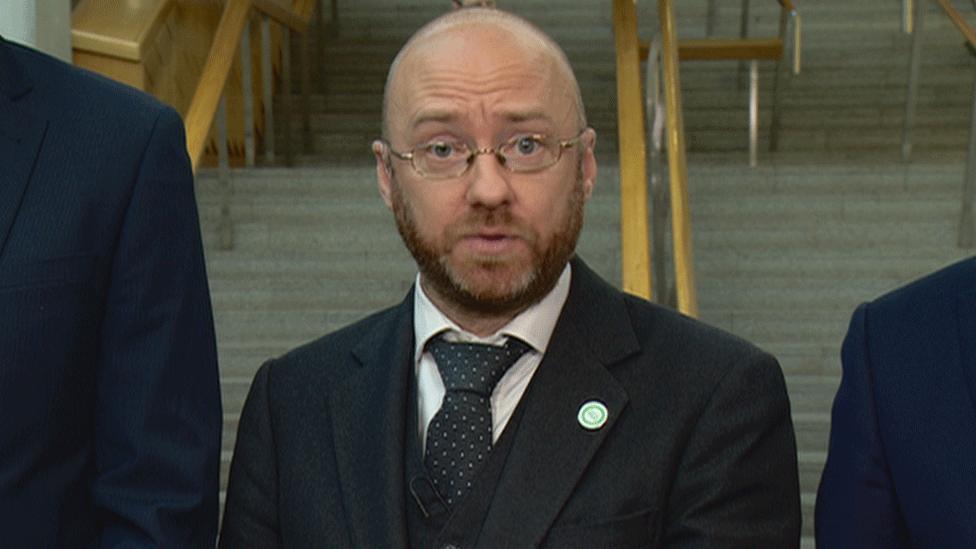
- Published1 February 2017
- Published25 January 2017
